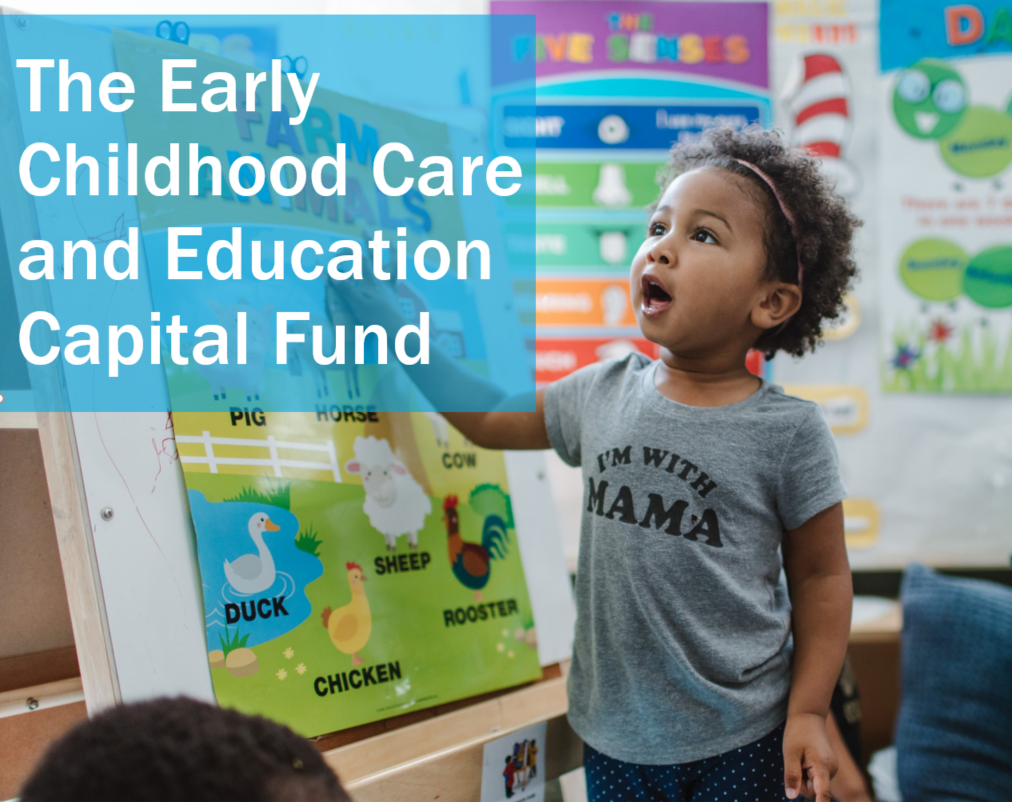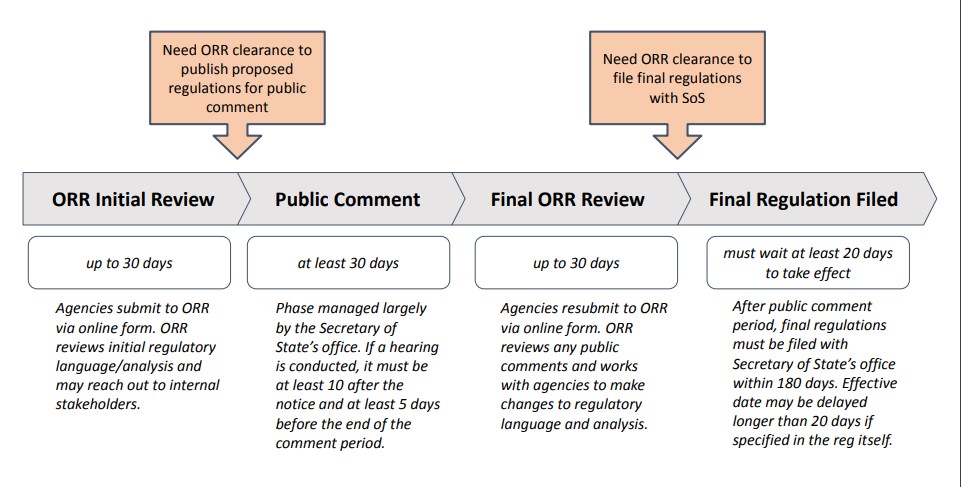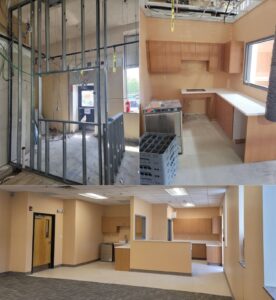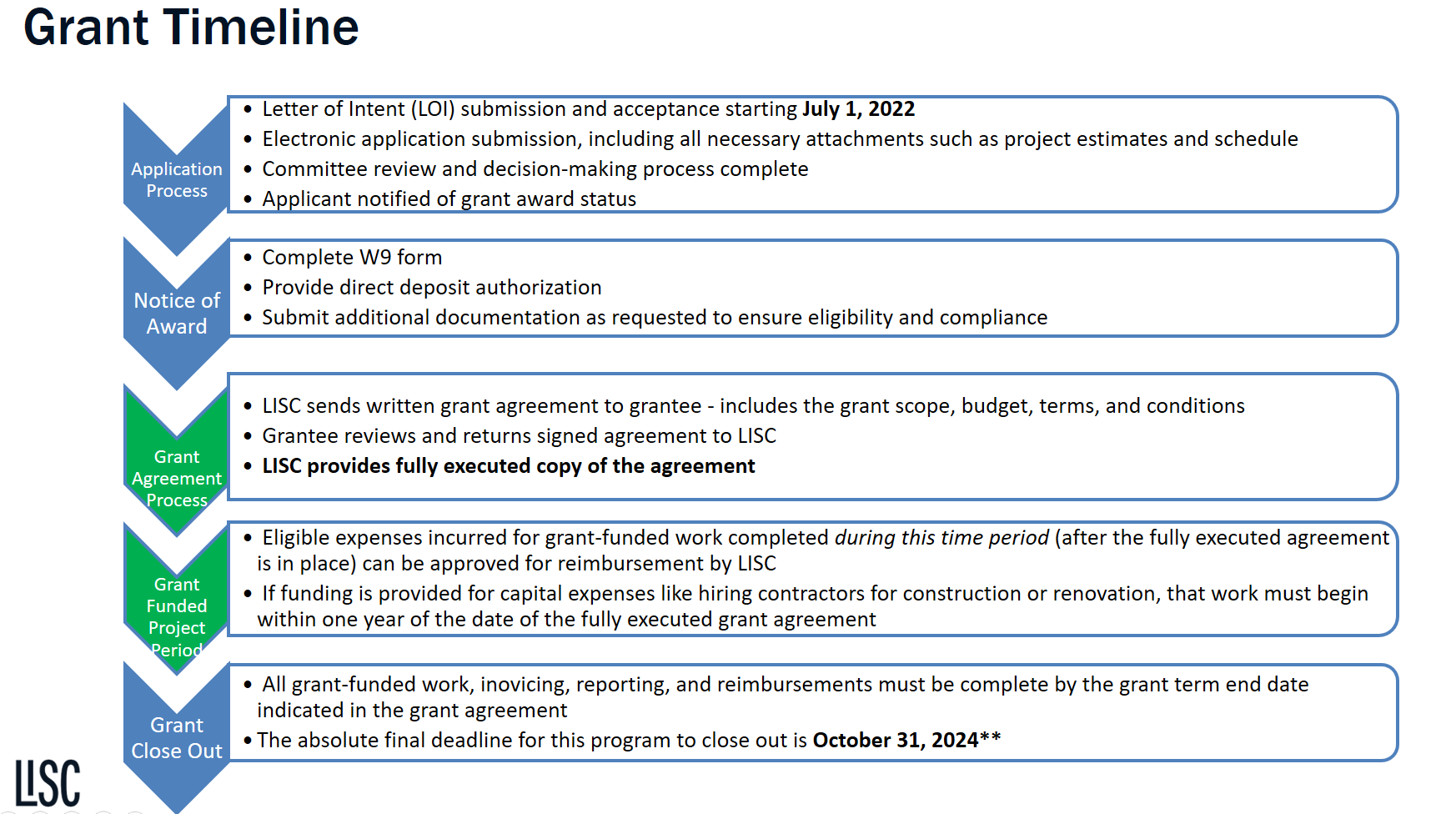
Background and Overview
All children deserve high-quality, developmentally appropriate learning environments that are designed to keep them safe, healthy, and support their physical, behavioral and cognitive development. Equitable access to a high-quality early learning experience is essential to providing children with a strong pathway in school and life.
In the March 2021 special election, Rhode Islanders overwhelmingly voted in support of the Early Childhood Care and Education (ECCE) Capital Fund, providing more than thirteen million dollars ($13,000,000) in grant funding for physical improvements to existing child care spaces and for the development of new licensed early childhood care and education facilities.
The rules and regulations that govern the ECCE Capital Fund program have been filed as final regulation here.
If you are a home-based family child care provider, we have created a dedicated FCC facilities resource page, including information and resources on this grant program that are specific to FCC providers. We encourage you to click here to visit the “Home-Based Facilities: Repairs and Small-scale Renovations / Instalaciones en el Hogar: Reparaciones y Renovaciones de Pequeña escala” page.
LISC and DHS offered a program overview and information session on Wednesday, June 15th. You can click here to view the recorded session and click here to see a copy of the PowerPoint presentation (en Español). LISC and DHS will begin accepting Letters of Intent on July 1, 2022.
Read more about how to submit a Letter of Intent (or LOI) in the Application and Decision-Making Process section below.
This grant funding will be distributed through a competitive application process that will open July 1, 2022. Funds will be available for two different purposes:
1) Small renovation and repairs to address urgent health and safety needs, quality improvements and reconfiguration of existing child care spaces
2) Large construction, rehabilitation of vacant or blighted properties, or large-scale expansion to create new, high quality spaces
This is a reimbursement-based grant program. This means, if you are awarded grant funding, grant-funded expenses must be approved, incurred and paid for during the grant term prior to receiving reimbursement (evidence of expense and payment such as invoices and cancelled checks will be required).
We will be temporarily pausing our weekly Wednesday 12pm-1pm virtual office hour sessions; however, you can always reach out via email at riecce-capitalfund@lisc.org or phone at 401-331-0131 to speak with a member of the team.
You can also view our Frequently Asked Questions page for additional information here.
We are excited to announce the first Wave of $8.5M in grant funding awards for capital improvement and expansion projects through the Early Childhood Care & Education (ECCE) Capital Fund. Congratulations to the first round of grantees!
We are excited to announce the second wave of more than $4M in grant funding awards for expansion projects through the Early Childhood Care & Education (ECCE) Capital Fund. Congratulations to the second round of grantees!
ECCE Capital Fund Eligibility Overview
“Eligible facility” means a building, structure, or site that is, or will be, owned, leased, or otherwise occupied by one (1) or more “Eligible Organizations” and licensed by DHS Child Care Licensing or a Local Education Agency (LEA); provided that
- 1. The facility shall serve or have a commitment to serve low-income families;
- 2. Any leased facilities shall have a lease term that is consistent with the scale of capital investment involved but shall not, under any circumstance, be less than twenty (20) years inclusive of options; and
- 3. Any municipally-owned buildings shall have a dedicated single-purpose space for licensed Early Childhood Care and Education.
If you are considering a proposal for ECCE Capital Funding, you will be required to provide a document, signed by the property owner, indicating they consent and approve to the proposed project, they will maintain the space as a child care and early learning program for at least 20 years, and, in the case of leased spaces, they will enter into a lease or written agreement of at least 20 years from the date of the award or a lease with options that comprise a full 20-year period in the event a grant is awarded. For example, if you have a 5 year lease term, you could have options to renew for an additional three 5 year leases to add to a total of 20 years.
1) A child care provider that is, at the time of application, providing, or has demonstrated a commitment to provide early childhood care and education for low-income families with a public subsidy (“Public subsidy” means the Rhode Island CCAP program, the Federal Head Start program, or any other materially similar child care subsidy program offered by a Federal, State, municipal, or quasi-public entity, OR
2) A for-profit or nonprofit developer or a community-based organization that is partnered with or is committed to partnering with a child care provider that has demonstrated a commitment to provide early childhood care and education for low-income families with a public subsidy (evidence such as a memorandum of understanding between the developer and child care provider may be requested)
All eligible organizations must:
- – Provide a Unique Entity ID (SAM) – if you do not currently have a Unique Entity ID, please visit SAM.gov to get one assigned to your business entity – Watch a “how to” video and read the step-by-step quick guide for getting a Unique Entity ID
– Be operating in good standing in the State of Rhode Island and with RI DHS Child Care Licensing*
* In good standing with RI DHS Child Care Licensing refers to early care and education programs currently free of any pending investigations or any pending or past legal actions, or other actions that call into question the Eligible Organization’s capacity to care for children in a manner that ensures their safety, This determination will be made at the discretion of RI DHS Child Care Licensing.
“Eligible project” means the acquisition, design, construction, repair, renovation, rehabilitation, and/or other capital improvement of an Eligible Facility, including, but not necessarily limited to, remediation of deferred maintenance.*
For a project to be eligible, applicants must clearly demonstrate:
1. A need for the project proposed
2. How the project benefits low-income children and the surrounding community
3. A financial need for assistance in the form of grant funding for the project to be feasible (please note, if an award is made, the amount of the award will be based on the demonstrated minimum amount required to fill the financial need with grant funds, not necessarily on the requested amount)
4. Local support for the project
*Please note that Wave 2 funding decisions will be focused solely on projects that will create new, high quality early learning slots. While we continue to advocate for additional funding for capital improvements to existing spaces, this round of funding will be for expansion only.
Grant funds will be used to cover eligible costs associated with the design, construction, repair, renovation, rehabilitation or other capital improvement or deferred maintenance of an eligible facility such as:
- – Preparation of reports, plans, engineering, specifications, and/or inspections,
– Construction, rehabilitation, expansion, demolition, site work,
– Upgrading or conversion of building systems, and
– Costs of furniture, fixtures, and/or equipment.
Examples of eligible costs for repair and renovation of existing child care facilities may include but are not limited to:
- – Repair/replacement of unsafe fencing or installation of additional fencing to meet licensing regulations
– Installation of safety egress where required by health and safety rules and regulations
– Installation of safety surfacing under structures that are otherwise deemed in compliance with ASTM and CPSC guidelines
– Costs to remove unsafe equipment
– Remediation/improvement of a direct facility-related item as a result of a compliance or regulatory visit
– Purchase/installation of shade structures in an outdoor space
– Purchase/installation of handwashing sinks
– Purchase/installation of storage/shelving
Examples of grant uses to expand or develop new sites may include, but are not limited to:
- – Planning and feasibility such as professional architectural design services for project feasibility and concept design; site analysis; engineering studies; legal services
– Site acquisition (the cost to purchase and prepare property for its intended purpose)
– Construction of a new site (ground up construction)
– Renovation of a newly purchased/leased site
– Expansion/Addition of existing site
– Large-scale renovation or retrofit of existing site
– Mixed Use Development (a land development containing two or more major types of uses including child care space- Program grant resources would fund child care portion only)
*Please note that Wave 2 funding decisions will be focused solely on projects that will create new, high quality early learning slots. While we continue to advocate for additional funding for capital improvements to existing spaces, this round of funding will be for expansion only.
ECCE Capital Fund Program Priorities
The Program represents a limited resource with a large mandate.
To ensure that resources are expended efficiently and in a manner that most positively impacts the intended beneficiaries, DHS has established the following list of program funding priorities.
- 1. Level to which project improves access to early childhood care and education in underserved communities
- 2. Level to which applicant has demonstrated commitment to serving families with public subsidy
- 3. Includes development of space for infants/toddlers
- 4. Proposes matching funding for project (evidence such as bank statements to verify the availability of proposed matching funds may be requested)
- 5. Solicits and/or includes participation of businesses certified by state Office of Diversity, Equity & Opportunity (ODEO), including construction companies and/or businesses
Application and Decision-Making Process
Carefully review eligibility criteria to ensure you are meeting baseline requirements. If you are unsure of whether you meet the criteria, please reach out to the LISC RI Child Care Facilities Fund team for guidance at RIECCE-Capitalfund@lisc.org or 401-331-0131.
Submit a Letter of Intent (LOI) to the LISC RI Child Care Facilities Fund Team at RIECCE-CapitalFund@lisc.org. LOIs will be accepted on a rolling basis (please note decision-making schedule and dates below). Full proposals are not accepted at this point in the process. The LOI is intended to be an abbreviated description of your project, which will be used by LISC and RI DHS as an initial assessment of fit with resources available. The LOI should be a maximum of 3 pages.
Click here to view the Letter of Intent template.
*For guidance on assessing your organization’s capacity to carry out your project along with other helpful information including testing project feasibility and resources for selecting professionals, visit the Child Care Facilities Development & Financing resource guide.
Within 30 days of your LOI submission, LISC may request further information and/or clarification, and will notify you of authorization to proceed with one of the following next steps:
- – Set up meeting for further technical assistance from LISC staff and/or consultants; OR
- – Proceed to electronic application for one of the following specific grant types
- – Planning and/or capital repair and renovation grant for immediate health and safety, quality improvement, or space reconfiguration; or
– Planning and/or Capital grant for large scale development of space
- – Planning and/or capital repair and renovation grant for immediate health and safety, quality improvement, or space reconfiguration; or
Please note that all applications must be submitted electronically. If you are unable to complete an online application, please contact the LISC team at RIECCE-CapitalFund@lisc.org or 401-331-0131 for assistance. Incomplete applications will not be accepted.
Online applications will first be reviewed by LISC staff to ensure basic eligibility and completeness. Eligible, complete applications will then be reviewed by RI DHS and released to a review committee, which will evaluate each application based on the scoring rubric.
Applications will be assigned a score which will determine the funding recommendation. RI DHS will then give final award approval based on the results of the committee meeting. These funding recommendations will be made and provided to applicants based on the following schedule:
- – LOIs received by Friday, March 24, 2023 will be reviewed by LISC and DHS for approval to continue to an online application or to receive additional technical assistance
- – For those who submit an LOI and are approved to move to the online application, complete applications received by Friday, April 21, 2023 will be reviewed and decisions made in early May of 2023.
In addition to meeting eligibility requirements and scoring based on the identified criteria using the rubric, selection will also be based on:
- – The clarity and completeness of the application;
– A site assessment by LISC staff or consultant prior to the final decision to award funding, either done by phone, virtual meeting or on site; and
– The availability of funding.
The decision for acceptance of LOIs and grant applications will be made at the discretion of LISC’s Rhode Island Child Care and Early Learning Facilities Fund in partnership with RI Department of Human Services.
Successful applicants who have been approved for funding will provide necessary information to LISC to enter into a formal grant agreement. This may include, but is not limited to, a W9 form, direct deposit authorization, and additional business financial information. A written agreement will be sent via email for review and signature by the grantee and LISC will then provide a fully executed copy of the agreement.
Grant Funded Project Period
The beginning date of a project period will be the date a successful applicant enters into a signed grant agreement with LISC following approval by LISC, RI DHS, and the decision making committee. The end date will be determined by the term end date in the signed grant agreement (and will be based on the timeline proposed in the application submission).
Funds spent on the grant-funded project after the date of the execution of the LISC grant agreement shall be eligible for reimbursement. If repair, renovation, or construction funding is awarded, project construction must begin within one year of the date of the signed grant agreement and must be completed by the term end date in the signed grant agreement.
Any extensions to the time period will be made at the discretion of LISC. All grants funded under this program must be closed out (grant-funded work complete, expenses paid and reimbursed, and reporting complete) by the ECCE Capital Fund program’s end date of October 31, 2024.
Key Dates
Letters of Intent (LOI) accepted starting July 1, 2022 on a rolling basis (template available). For Wave 2 consideration, LOIs must be submitted no later than Friday, March 24, 2023. LISC may then request further information and/or clarification, and will notify you of authorization to proceed with one of the following next steps:
- – Set up meeting for further technical assistance from LISC staff and/or consultants; OR
- – Proceed to electronic application (LISC will provide you access to the application)
*Please note that Wave 2 funding decisions will be focused solely on projects that will create new, high quality early learning slots. While we continue to advocate for additional funding for capital improvements to existing spaces, this round of funding will be for expansion only.
Complete applications received by Friday, April 21, 2023 will be reviewed in late April with applicants notified in early May 2023.
*Please note that Wave 2 funding decisions will be focused solely on projects that will create new, high quality early learning slots. While we continue to advocate for additional funding for capital improvements to existing spaces, this round of funding will be for expansion only.
Helpful Links
- – A PDF of the full grant information and instructions document
- – Rules and Regulations to govern the ECCE Capital Fund
- – The recorded Informational Session
- – The PowerPoint presentation from the Informational Session
- – Letter of Intent template
- – Property owner’s assurances form required for all applicants
- – Application questions for REFERENCE ONLY – Large-scale expansion and development of new facilities
- – Application questions for REFERENCE ONLY – Small-scale renovations and repairs to existing child care facilities to address health, safety, and quality concerns.
- – Scoring criteria/rubric
- – Frequently Asked Questions (FAQ)
Other Resources:
- – Request LISC staff or consultant technical assistance
- – Resource guides on topics such as developing early childhood facilities and designing early childhood facilities
- – Rhode Island Early Learning Facility Self-Assessment Tool
- – “Fast Fact” documents including topics such as fencing and barriers, safety surfacing, securing a contractor, and more.
- – LISC lending information
Additional Related Information
The rules and regulations that will govern the ECCE Capital Fund program are subject to the State of RI’s Office of Regulatory Reform (ORR)’s review process. The RI Department of Human Services (DHS) is statutorily obligated under the provisions of Rhode Island’s Administrative Procedures Act to follow this rigorous process, requiring regulations to be reviewed by ORR before and after a mandatory public comment period prior to filing final regulations.
ORR has completed its final review following the public comment period. Regulations have been filed as final and can be read here.

In anticipation of the finalization of ECCE program rules and regulations which will trigger a program launch including informational and other training sessions along with the release of a competitive application process, the RI Child Care Facilities Fund wanted to re-share some resources already available to you to help you think through, plan, and prepare for this opportunity.
Technical Assistance – One of our core services, LISC staff and consultants are available to provide early learning programs with technical assistance on all aspects of facility design and development. You can access those services here.
Resource Guides – All resource guides can be accessed and downloaded here and include tools and resources to help you develop your plans.
Online Training Courses – Registering for our Self-paced online courses gives you access to training sessions on topics such as Child Care Development & Financing which can provide a useful overview of early feasibility and planning activities, such as building an appropriate project development team, selecting and acquiring a site, raising money, and completing construction. (Each course also counts towards three professional development hours!)
Tools – Utilizing one of our checklist tools can allow you and your team to view your space differently and prioritize potential repair and renovation projects.
Recorded Trainings – Learn more about outdoor design best practice philosophy and elements in this training excerpt conducted with our partners at studioMLA Architects. Take a dive into Rhode Island specific child care and early learning facility projects including regulatory considerations for facilities in the training excerpt here.
Rhode Island has an opportunity to invest in early childhood education to help close achievement gaps, support our working families, and better prepare our workforce of tomorrow. Equitable access to a high-quality early learning experience is essential to providing children with a strong pathway in school and life.
All children deserve high quality, developmentally appropriate early learning environments designed not only to keep them healthy and safe, but also to support their physical, behavioral and cognitive development. The physical conditions of early care and education spaces directly impacts the success of these programs.
Rhode Island wants to see real change in its early learning infrastructure and will require significant investment to support this initiative. To balance the enormous scope of the challenge with the realities of projects ready to move forward, a $15 million bond authorization request will appear on the March 2021 Special Election ballot


